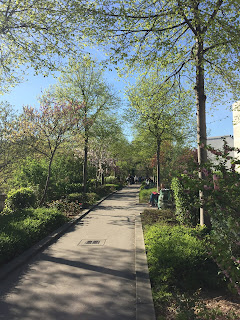As I sit here and write this, my dog lays on my lap, he sleeps, he is warm, it's cold today in Brazil because it's winter, yet not even close to Chicago's winter.
My friends from high school are about to come over soon, we'll order a pizza then watch a shitty movie and talk... We won't drink wine, we won't eat fromage or charcuterie... We won't discuss politics, or philosophy, we'll probably gossip, talk about boys, or what items they want to purchase soon.
It's a different life, one that I always felt myself distant from even when I was still 100% Brazilian. Now I barely consider myself that, I'm so different from all of them. Even my host mom in Paris, who has had many Brazilians throughout the years, has said that I'm not Brazilian.
Here I feel that my life has stopped, it's paused because here I have to conform with the culture, with the people, and their lack of interest on the things that I'm interested on, I have to keep my real opinions to myself most of the time, and especially my disgust with some of their actions. I love them, but we have grown apart, I feel like I'm the same, yet I'm not. I think I was always a stranger here, now I have had the opportunity to find myself, I experienced other things, and that did change me a bit, but I'm still the same in many ways, I was always disgusted with too much materialism, or gossip.
In Paris, with my friends, I had different conversations, I was myself, I was busy living, wanting to discover new things, discover what I liked and what I didn't like. Here, it's all too familiar, there's nothing more to discover. I'm bored. I miss Paris everyday.
To distract myself I have decided to read, I've been reading to get away from my reality a bit, I thought that by reading Hemingway's A Moveable Feast, I would be transported back to Paris, but that was not a good thing. I missed it even more, but it did help me cop with what I was feeling. I came across many quotes that talked to me.
One of them was this one, and it's almost about my life:
“By then I knew that everything good and bad left an emptiness when it stopped. But if it was bad, the emptiness filled up by itself. If it was good you could only fill it by finding something better.” ― Ernest Hemingway, A Moveable Feast
I never really understood why when I left Chicago I felt a bit empty, because I knew that wasn't the city I wanted to live in, to me that was the bad, and Paris of course, the good, the difference of course is that I will never be able to fill the emptiness Paris left me with.


















